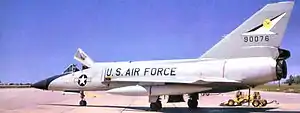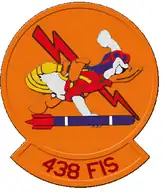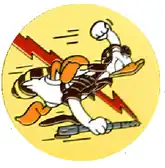| 438th Fighter-Interceptor Squadron | |
|---|---|
 Convair F-106 about 1967 with squadron emblem in tail markings | |
| Active | 1943–1944: 1953–1968 |
| Country | |
| Branch | |
| Role | Fighter Interceptor |
| Insignia | |
| 438th Fighter-Interceptor Squadron emblem (F-106 era) |  |
| 438th Fighter Squadron emblem (approved 16 February 1944)[1] |  |
The 438th Fighter-Interceptor Squadron is an inactive United States Air Force unit. Its last assignment was with the 35th Air Division at Griffiss Air Force Base, New York, where it was inactivated on 30 September 1968. The squadron was first activated as the 438th Fighter Squadron during World War II. It served as an Replacement Training Unit until the spring of 1944, when it was disbanded in a general reorganization of Army Air Forces training units. It was reactivated in 1953 as an air defense unit and served in that role until inactivated.
History
World War II
.jpg.webp)
The squadron was first organized in February 1943 at Page Field, Florida as the fourth squadron of the 53d Fighter Group. It was initially equipped with Bell P-39 Airacobras, but before the year was over, switched to training pilots with the Republic P-47 Thunderbolt. The squadron was an Replacement Training Unit, an oversized unit whose mission was to train individual pilots.[1][2][3]
However, the Army Air Forces found that standard military units like the 438th, based on relatively inflexible tables of organization were not well adapted to the training mission. Accordingly, it adopted a more functional system in which each base was organized into a separate numbered unit, manned according to the base's mission.[4] The 53d Group and its two squadrons at Page Field, along with supporting units there were disbanded and replaced by the 338th AAF Base Unit (Replacement Training Unit, Fighter) in May 1944.[1][2][5]
Air Defense Command

The squadron was reactivated under Air Defense Command as the 438th Fighter-Interceptor Squadron, and stationed at Kinross Air Force Base, Michigan in April 1953.[1] At its new base, the 438th was assigned to the 534th Air Defense Group and equipped with cannon-armed Lockheed F-94B Starfires.[6] During the next seven years, it repeatedly upgraded its equipment. In December 1953 it transitioned into Northrop F-89D Scorpions, armed with FFAR rockets, and in the May 1957 into Convair F-102A Delta Daggers, equipped with data link for Semi-Automatic Ground Environment operations and armed with AIM-4 Falcons. In June 1960 it received the Convair F-106 Delta Darts that would equip it for the remainder of the time it was on active duty. In August 1955, as part of Project Arrow, the 534th Group was inactivated and the squadron became part of the 507th Fighter Group.[1][6][7]
On 22 October 1962, before President John F. Kennedy told Americans that missiles were in place in Cuba, the squadron dispersed one third of its force, equipped with nuclear tipped missiles to Phelps Collins Air National Guard Base at the start of the Cuban Missile Crisis.[8][9] These planes returned to Kinchloe after the crisis.
Air defense fighter operations at Kinchloe ended on 30 September 1968 with the inactivation of the 507th Fighter Wing.[10] The squadron moved to Griffiss Air Force Base, New York, where it transferred its F-106s to the 49th Fighter-Interceptor Squadron, which had been flying air defense missions with McDonnell F-101 Voodoos from Griffiss since 1959, and the 438th was inactivated the same day.[6][11]
Lineage
- Constituted as the 438th Fighter Squadron on 12 February 1943
- Activated on 20 February 1943
- Disbanded on 5 May 1944
- Reconstituted and redesignated 438th Fighter-Interceptor Squadron on 11 February 1953
Assignments
- 53d Fighter Group, 20 February 1943 – 1 May 1944
- 534th Air Defense Group, 27 April 1953
- 507th Fighter Group, 18 August 1955
- 507th Fighter Wing, 1 February 1961[10][12]
- 35th Air Division, 30 September 1968[6]
Stations
Aircraft
See also
Notes
- ↑ Aircraft is Convair F-102A-80-CO Delta Dagger, serial 56-1499.
References
- 1 2 3 4 5 Maurer, Combat Squadrons, p. 543
- 1 2 Maurer, Combat Units, pp. 115-116
- ↑ Craven & Cate, Introduction, p. xxxvi
- ↑ Goss, p. 75
- ↑ Maurer, Combat Squadrons, pp. 83-84
- 1 2 3 4 5 6 Cornett & Johnson, p.128
- ↑ Buss, et al., p. 6
- ↑ McMullen, pp. 10–12
- ↑ NORAD/CONAD Participation in the Cuban Missile Crisis, p. 16
- 1 2 3 Robertson, Patsy (19 March 2012). "Factsheet 507 Air Refueling Wing (AFRC)". Air Force Historical Research Agency. Retrieved 5 September 2015.
- ↑ Cornett & Johnson, p. 116
- 1 2 3 4 Lineage, including assignments, stations and aircraft through 1963 in Maurer, Combat Squadrons, p. 543
Bibliography
![]() This article incorporates public domain material from the Air Force Historical Research Agency
This article incorporates public domain material from the Air Force Historical Research Agency
- Buss, Lydus H.(ed), Sturm, Thomas A., Volan, Denys, and McMullen, Richard F., History of Continental Air Defense Command and Air Defense Command July to December 1955, Directorate of Historical Services, Air Defense Command, Ent AFB, CO, (1956)
- Cornett, Lloyd H.; Johnson, Mildred W. (1980). A Handbook of Aerospace Defense Organization, 1946–1980 (PDF). Peterson AFB, CO: Office of History, Aerospace Defense Center. Archived from the original (PDF) on 13 February 2016. Retrieved 11 March 2014.
- Craven, Wesley F; Cate, James L, eds. (1955). The Army Air Forces in World War II (PDF). Vol. VI, Men & Planes. Chicago, IL: University of Chicago Press. LCCN 48003657. OCLC 704158. Retrieved 17 December 2016.
- Goss, William A. (1955). "The Organization and its Responsibilities, Chapter 2 The AAF". In Craven, Wesley F.; Cate, James L. (eds.). The Army Air Forces in World War II (PDF). Vol. VI, Men & Planes. Chicago, IL: University of Chicago Press. LCCN 48003657. OCLC 704158. Retrieved 17 December 2016.
- Maurer, Maurer, ed. (1982) [1969]. Combat Squadrons of the Air Force, World War II (PDF) (reprint ed.). Washington, DC: Office of Air Force History. ISBN 0-405-12194-6. LCCN 70605402. OCLC 72556.
- McMullen, Richard F. (1964) "The Fighter Interceptor Force 1962–1964" ADC Historical Study No. 27, Air Defense Command, Ent Air Force Base, CO (Confidential, declassified 22 March 2000)
- NORAD/CONAD Participation in the Cuban Missile Crisis, Historical Reference Paper No. 8, Directorate of Command History Continental Air Defense Command, Ent AFB, CO, 1 Feb 63 (Top Secret NOFORN declassified 9 March 1996)
Further reading
- "ADCOM's Fighter Interceptor Squadrons". The Interceptor (January 1979) Aerospace Defense Command, (Volume 21, Number 1)
